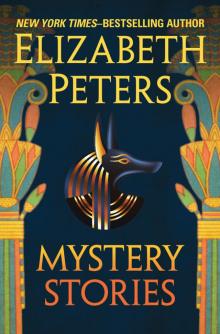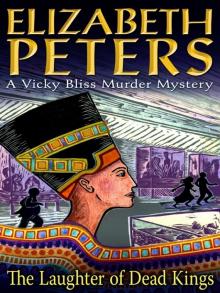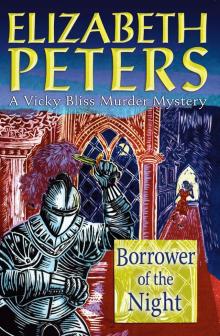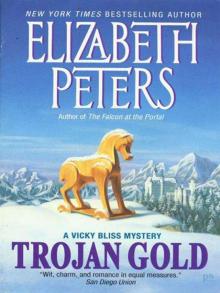- Home
- Elizabeth Peters
Borrower of the Night vbm-1 Page 7
Borrower of the Night vbm-1 Read online
Page 7
‘No, but I’ve been thinking.’ I unwound the last bramble and stepped back onto the path. ‘The shrine wouldn’t be considered treasure trove, would it? That is strictly defined legally; depending on local laws, it belongs either to the state or to the state and the finder, half and half. But the shrine belongs to the Drachensteins; that can be proved by means of the documents we’ve been using. And – listen. The old lady is only a Drachenstein by marriage. If Irma is the count’s brother’s child, wouldn’t she be the heiress?’
‘Good point,’ said Tony, brightening visibly. ‘We might try to find out about the late count’s will. Not that it has any bearing on our search . . .’
‘But it would add to your zeal to think that Irma would enjoy the fruits of your brilliance?’
We had reached the keep and stood beside the high walls. Tony ignored my last remark and its tone of heavy sarcasm.
‘Behold the Wachtturm,’ he said, gesturing. ‘It was built in AD eight hundred and seven by Count Meninguad von und zu Drachenstein, fondly known to his contemporaries as the Black Devil of the Tauber Valley. The keep was abandoned in thirteen eighty-three when the present castle was built. In fifteen hundred and five – ’
‘All right, all right. I’ve read the guidebook too. Let’s go in.’
There was no door. Rusted iron hinges, each a couple of feet long, hung futilely from the doorframe. The interior of the first floor was a single circular room, dimly lit by the four narrow slits that pierced the walls. Since said walls were over eight feet thick, the sunlight didn’t have much of a chance. The floor was of stone, but so overlaid with dirt that the original surface was virtually invisible.
Tony made a circuit of the walls, peering at the huge stones.
‘When they built in those days, they built to last.’ He spoke in hushed tones, as if something might be listening. ‘I can’t see anything unusual here. Let’s go up.’
Narrow stairs were cut into the stones of the wall. They were treacherous to climb; each step had a deep trench in the centre, worn by generations of feet.
The second floor had been the hall. The windows were a little wider than those below. Across one quadrant of the room lay the remains of a half-wall, or screen, of stone, behind a low dais. The big stone fireplace, with the family arms on its hood, was the only feature in the room, which was littered with chips of fallen stone.
‘The count and his lady dined there,’ Tony muttered, looking at the dais. ‘Their sleeping quarters were behind the screen. Rushes underfoot, and the dogs fighting over table scraps . . .’
‘Gracious living,’ I agreed. ‘According to the guidebook, this place was abandoned long before fifteen twenty-five. It wouldn’t be a bad spot to hide something.’
Tony shook his head.
‘It may have been abandoned as living quarters, but I’ll bet it was still in use as a guard tower. Anyhow, if I were the count, I’d prefer to have my valuables closer at hand, so I could keep an eye on them. Way out here – ’
He stopped speaking. He was opposite one of the window slits, and a narrow shaft of sunlight lay across the section of the floor at which he was staring.
‘What – ’ But I didn’t have to finish the question. I saw them too – footprints, clearly marked in the thick dust. The footprints of a man – a big man.
Tony knelt down. He thumped the floor with his fist, and sneezed as a cloud of dust enveloped his head.
‘If anything has been hidden under these boards, I’ll eat it,’ he announced, between sneezes. ‘Feel them. You’d expect wood so old to be rotten and crumbling, but these boards are practically petrified.’
I joined him on the floor. As my fingers touched the rock-hard surface of the wood, I felt weighted down by the sheer overwhelming age of the place.
‘They wouldn’t have been this hard four hundred years ago,’ I said.
‘That’s not what I meant. Look at the construction of the floor. There’s only one thickness of wood – each plank is a foot thick, sure, but there’s no space for a hiding place in between them. The beams in the ceiling below support these planks.’
‘How big is the shrine, anyhow?’
‘No dimensions were given.’ Tony went to the wall and thumped ineffectually at the stones. ‘But I should think it would have to be a metre or so high. Maybe bigger.’
Okay, I thought to myself; if you don’t want to talk about those footprints, we won’t talk about them. And I won’t mention the light I saw here last night. For all I knew, it might have been Tony who had carried that light, and this expedition might be a blind, to convince me of the futility of the Wachtturm as a hiding place. I watched Tony idiotically bruising his hands on impenetrable stone, and winced. If he had come here alone in the small hours of the night, I had to admire his nerve. The place was sinister enough in broad daylight. I tried to remember how much time had elapsed between my seeing the light, and leaving my room. I couldn’t estimate accurately. Tony might have had time to get back from the keep and accost me in the corridor.
Tony turned from the wall.
‘These stones look solid to me. We’d have to demolish the place to make sure nothing was hidden here.’
‘So why are we wasting our time?’
‘Let’s have a look at the top floor, just in case.’
I got to the stairs ahead of him. When I came out onto the next floor, I stopped short, swaying with a sudden attack of vertigo. There was no top floor. The roofless walls were waist high at some points; mostly there was no wall at all, only a sudden drop into the thorny brambles far below. The view across the green valley was sensational, but I didn’t linger to look at it. I backed cautiously towards the stairs, and Tony went with me. It was unnecessary to speak; there was no hiding place up there.
When we were out in the sunlight again, Tony drew a deep breath.
‘That takes care of that. The Schloss is the place for us.’
‘It’s so damned big. Where do we start looking?’
‘I think more research is indicated.’
‘You just want to sit around and read books,’ I said unreasonably. ‘I want to do something. Even if we don’t know where Burckhardt’s room was, there are other possibilities. The crypt, for instance – ’
‘How do you know there is a crypt?’
‘There’s a chapel.’
‘Okay, I’ll give you the crypt. I still want a detailed plan of the Schloss.’
‘And where do you expect to find it?’
‘Two possibilities. The town archives, for one. Also the library, or muniment room of the Schloss. There may be other letters or useful documents there too.’
‘Okay,’ I said grumpily. ‘If you’re going to be the honest, candid little fellow, I can do no less. You take the archives, I’ll take the library. We share any information we find.’
‘Agreed.’
When we reached the courtyard, we found an unexpected duo sitting at one of the tables in the garden. George Nolan and Professor Schmidt were deep in conversation – or rather, Schmidt was talking and George was listening. I thought he looked bored. He brightened when he saw us.
‘Exploring, on a hot day like this?’ he inquired.
‘You know us.’ I dropped into a chair and smiled affably at him. ‘Nothing in the Wachtturm but dust and decay.’
‘But I thought Americans admired the old and decayed,’ said Schmidt.
I was getting a little tired of hearing that sentiment expressed, but I said only, ‘That place is too old.’
‘You should see the town. It is not too old. It is very nice.’
‘I’ve been here before,’ I said.
‘But not with me,’ George said. ‘Let’s go sightseeing. Harmless occupation,’ he added.
‘Gut, gut,’ said Schmidt eagerly. ‘I know Rothenburg well. There is a Gasthaus where we will lunch.’
‘We have to be back here by four,’ Tony said, regarding Schmidt unfavourably. ‘The countess has invited us – ’
‘But I also! I also have tea with the Gräfin. We can easily return by four.’
There was no way of ditching him, short of deliberate rudeness. He turned out to be a rather pleasant companion, and an absolute mine of useless information. My half-formed doubts about him faded as the morning passed; he seemed harmless and rather endearing.
Looking like innocent tourists – which three of us certainly were not – we wandered clear across town to the old hospital area, while Schmidt spouted statistics about every building we passed. There are some lovely old buildings in the big hospital court; some of them are now used as a youth hostel. After the rather oppressive antiquity of the Schloss and its sombre inhabitants, I enjoyed seeing the kids swarming around, weighted down by their backpacks but having a marvellous time anyhow. Sure, most of them were pretty dirty by the time they got halfway across Europe; cleanliness is a luxury when you are short on money and even shorter on time. Like any other mixed group, they had their share of no goods, but most of them were nice kids seeing the world – pilgrims, of a kind. As we stood there, a pair of them emerged from the unadorned facade of the early Gothic church. I admit it was hard to determine their sex; but with their long locks and faded clothes they didn’t look as incongruous as one might have expected.
Outside the hospital stands one of the more formidable of the city gates. George, who was visiting Rothenburg for the first time, seemed fascinated by the fortifications. He nodded approvingly at the sections of wall that stretched out from both sides of the gate.
‘They wouldn’t stand up against artillery, but I’d hate to attack the place with anything less. A roofed walkway all around for the defenders – arrow slits, I suppose, on the outer wall . . . ?’
‘That is correct,’ Schmidt said. ‘They are proud of their wall, it is one of the best preserved in Europe.’
‘Can you walk along it?’
It was a stupid question; we could see at least a dozen people up above, walking or leaning over the wooden rail that fenced the walkway on the town side. But Schmidt answered seriously, ‘To be sure you can. The walk is kept in repair.’
‘But not now,’ Tony said. ‘Where’s this restaurant? I’m starved.’
We had an excellent lunch, which included one glass of beer too many for me. Schmidt was glassy-eyed; he had eaten everything he could get his hands on, including a couple of extra platters of heavy dark bread. He announced his intention of taking a nap, and I had to admit it sounded like a good idea.
‘I’m going to walk some more,’ said Tony, with a meaningful glance at me. ‘See you later.’
He intended, of course, to search out the town archives. I really meant to look for the library, to keep my part of our bargain. But it was a hot day, and my stone-walled room was nice and cool, and the bed was soft. I didn’t wake up till Tony banged on the door, and I discovered I had just time enough to assume my best bib and tucker for the tea party.
My first sight of the Gräfin’s room at the top of the tower took my breath away. It was full of treasures; there was no sign here of the genteel shabbiness that marked the rest of the Schloss. An eighteenth-century Kabinett, with panels of painted silk, might have been designed by Cuvilliés. Next to it was a writing desk, French by the look of it, that had beautiful brass inlays over its leather surface. The sofa and chairs dated from Ludwig I; crimson brocade seats bore the Drachenstein arms in gold, and the wood was gilded. The Gräfin had a weakness for gilt, but she tolerated crasser metals; the massive silver tea service on the table looked like Huguenot craftsmanship. I have seen poorer work behind glass in several museums. The place was rather like a museum, a selection of the best of Schloss Drachenstein. Only the hangings at the window were new. They were expensive looking, made of crimson fabric as heavy as felt, embroidered with – you guessed it – gold threads.
I have been told, by critics, that I have a nasty suspicious mind. The sight of that collection brought out my worst suspicions. If these pieces were representative of the original furnishings of the Schloss, then what had happened to the rest of the furniture and ornaments? And why were the surviving goodies all gathered here in the Gräfin’s lair? She might at least share them with her niece, to whom they probably belonged legally. I have seen maids’ rooms better furnished than Irma’s shabby quarters.
I turned from my appraisal to meet the Gräfin’s ironical eye. If she knew what I was thinking – and I wouldn’t have been surprised to discover that she could read minds – she made no comment. She indicated the tall Englishwoman, who was perched on the sofa beside the tea service.
‘My dear friend, Miss Burton.’
Miss Burton shook hands with us. Tony’s eyes widened when her bony fist clamped over his. Thus warned, and uninhibited by his archaic notions of courtesy, I was able to give Miss Burton a worthy grip when she tried to squash my fingers. She gasped. When she sat down again, her cheekbones were an ugly rust colour, and Tony shook his head at me. He was right; we should keep on amicable terms with the Gräfin as long as possible, and antagonizing her dear friend wouldn’t help. But the two women, who were unappealing separately, gave me the creeps when I saw them together. They only needed a third to qualify for the blasted heath bit in Macbeth. Somebody had to keep them in line, and that somebody wouldn’t be Tony. He’s incapable of talking back to any female over forty. They hypnotize him.
As I expected, Tony was a ready victim for the Gräfin. He stammered like a schoolboy when she spoke to him. Irma fluttered around, speechless and servile, offering plates of cookies. George sat and smiled. Schmidt’s small dark eyes darted from one face to the next in open curiosity. I was waiting for a chance to ask the Gräfin about the Schloss library. I had a valid excuse for being interested in historical records, and the less sneaking I had to do, the less chance there was of being caught in a place I had no business being in. But before I found my opening, Miss Burton, who had been eyeing Tony like a hungry tiger, interrupted her friend in the middle of a long speech about the antiquity, nobility, and all around virtue of the House of Drachenstein.
‘Elfrida, I believe this young man is a sensitive. Perhaps we should make use of him tonight.’
Tony, who didn’t know what the woman meant, and who thought the worst, looked horrified. The Gräfin smiled.
‘Miss Burton is a student of the occult,’ she explained.
‘Oh. Oh, God,’ said Tony, looking, if possible, even more aghast. ‘Look here – I mean, I’m no sensitive, if that’s what you call it. In fact – in fact – ’
He looked hopefully at me.
I contemplated the ceiling. I knew his views on spiritualism and the occult; they are profane. He has a morbid passion for ghost stories of all kinds, but only because he can suspend his disbelief for the purpose of entertainment. Torn between the requirements of courtesy and a thorough distaste, Tony looked in vain for rescue. He wasn’t going to get any help from me. It was high time he learned to stand up for himself.
‘In fact,’ Tony mumbled servilely, ‘I’m pretty ignorant about the whole subject.’
‘Ignorance is not uncommon,’ said Miss Burton, with a sigh. ‘Dreadful, when one considers the urgency . . . But I feel sure, Professor, that you are mediumistic. Look, Elfrida, at his hands . . . his eyes . . . There is a certain delicacy . . .’
Tony was beet-red.
‘But,’ he croaked.
‘Many mediums are unaware of their gift until they try,’ said Miss Burton, giving him a severe look.
There was a hideous pause. George, shaking with suppressed laughter, gave me a look that invited me to share his amusement. Schmidt was sitting bolt upright, his teacup in one hand, a half-eaten cookie in the other. He caught my eye; and to my surprise, he said seriously, ‘The Schloss is an admirable place for such research, Fräulein Doktor. There is a strong residue of psychic matter in a spot where so many have lived and died, loved and hated.’
‘You are a psychic researcher?’ I asked.
‘Only as an amateur.’
Miss Burton broke in.
‘If we can obtain only a moderate degree of cooperation from Professor Lawrence, the least one might expect from a gentleman and a – ’
I knew she was going to say it, and I knew I would laugh out loud if she did. It was time for me to be ingratiating; all this was leading up to something, and Schmidt’s attitude made me very curious indeed.
‘I’m sure Tony will be glad to help,’ I said, before Miss Burton could say ‘scholar.’ ‘We all will. Don’t you need a certain number of people to make up a circle?’
The countess turned to look at me.
‘How kind,’ she murmured.
‘Not at all,’ I murmured back. ‘I’ve always been fascinated by the occult.’
Tony made an uncouth noise which I ignored. I swept on, ‘One seldom finds an opportunity to hold a séance in such ideal surroundings. An old castle . . . a very old family . . .’
‘The Drachensteins trace their lineage unbroken to the ninth century,’ said the countess. ‘In 1525 the original line died out, but the title was assumed by a cousin.’
‘Died out? What happened to Count Burckhardt’s daughter?’
Tony’s question was followed by a silence which gave me time to think of all the things I was going to do to him for letting his big mouth loose again. In my opinion it was too early in the game to let the Gräfin know the full extent of our knowledge of, and interest in, the family of Graf Burckhardt. But since the damage was done, I decided to make the most of it.
‘As a prominent American historian of the Reformation,’ I said pompously, ‘Professor Lawrence is particularly interested in the sixteenth century.’
‘Ah, of course.’ You couldn’t call the gleam in the Gräfin’s eye a twinkle, but she was definitely amused. I found that expression even less attractive than her normal look. ‘No doubt you, too, are a prominent historian of the Reformation, Miss Bliss? It is a pleasure to find foreign scholars so well informed about our local history.

 Mystery Stories
Mystery Stories A River in the Sky
A River in the Sky He Shall Thunder in the Sky taps-12
He Shall Thunder in the Sky taps-12 Laughter of Dead Kings vbm-6
Laughter of Dead Kings vbm-6 Silhouette in Scarlet vbm-3
Silhouette in Scarlet vbm-3 Night Train to Memphis vbm-5
Night Train to Memphis vbm-5 Borrower of the Night vbm-1
Borrower of the Night vbm-1 The Golden One
The Golden One Trojan Gold vbm-4
Trojan Gold vbm-4 Crocodile On The Sandbank
Crocodile On The Sandbank